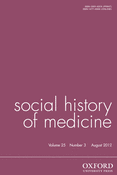-
Views
-
Cite
Cite
David Reubi, Duncan Wilson, Tissue Culture in Science and Society: The Public Life of a Biological Technique in Twentieth Century Britain, Social History of Medicine, Volume 25, Issue 3, August 2012, Pages 757–758, https://doi.org/10.1093/shm/hks041
Close - Share Icon Share
Extract
Duncan Wilson's monograph offers a fascinating insight into the cultural history of tissue culture—a laboratory technique that profoundly transformed twentieth-century biomedical science and which is usually associated with the work of French surgeon and eugenicist Alexis Carrel at the Rockefeller Institute for Medical Research in New York in the early 1910s. Focusing on Britain rather than North America, Wilson's book examines both the scientific development of this technique and, perhaps more interestingly, the changing narratives through which it has been imagined and portrayed by scientists, journalists, novelists and others over the course of the last century.
The book is divided in three parts. The first one (Chapters 2 and 3) concentrates on the interwar period, when tissue culture was still an experimental and contested method. Wilson shows how a few scientists at facilities like the Strangeways Research Laboratory in Cambridge sought to grow in vitro cells, whole organs and embryos from animal origins. Drawing on an impressive array of scientific lectures, novels, radio broadcasts and films, he also describes how these experiments were interpreted and construed through ideas that predominated at the time—modernist notions of ageing and death as manipulable; fears about social degeneration; ambivalence towards the new methods of mass production; and concerns about eugenics and birth control.




